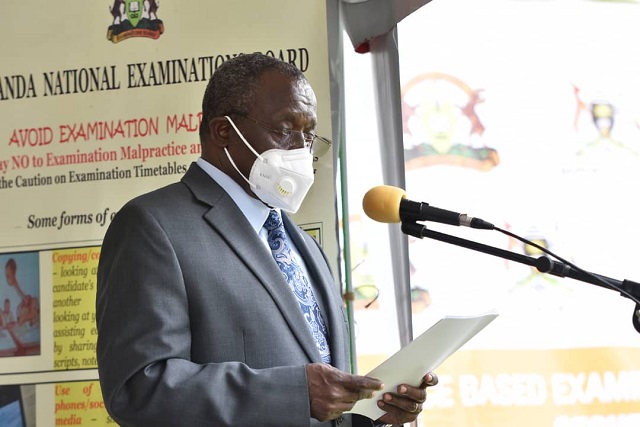KAMPALA: The Uganda National Examinations Board (Uneb) has indicated that more than 1.28 million learners have been registered to sit for the forthcoming 2022 national examinations across the country at all levels.
Releasing the post-lockdown examination timetables yesterday at the Uganda Media Centre, the Executive Director of Uneb, Mr Daniel Odongo, said the actual examinations will run from October 17 to December 9.
The senior four candidates are the first to start on October 17, followed by Primary Seven pupils on November 8 and then A-Level students on November 21.
The post-Covid-19 examination has seen a growth in the number of learners registered to sit for Primary Leaving Examinations (PLE) and Uganda Certificate of Education (UCE) by 98,099.
Mr Odongo said they have registered a total of 1,280,172 learners for the three sets of examinations. He said UCE is the first set of examinations to be held, starting on October 14 with the briefing of candidates.
Senior Four candidates will sit for their first paper on October 17 starting with Mathematics Paper 1 in the morning and Mathematics Paper 2 in the evening. UCE exams are slated to end on November 18.
According to the released timetable, PLE candidates will be briefed on November 7 and sit for their actual examination on November 8 and 9 starting with Mathematics and Social Studies.
Meanwhile, the Uganda Advanced Certificate of Education (UACE) will be the last set of exams to be conducted starting with briefing of candidates on November 18 and actual exams slated to start on November 21 starting with Mathematics. They will end their exams on December 9.
Mr Odongo asked heads of school to be keen and ensure that they brief the candidates on regulations that govern the examinations.
“The timetables include regulation on the conduct of the examinations and cautions to candidates on acts that amount to examination malpractice. Heads of school are requested to ensure that all necessary steps are taken to brief candidates to follow these regulations and the caution given,” Mr Odongo warned.
He added: “Failure to comply with regulations in the timetable leads to disqualification, cancellation of results or arrest of candidates.”
Increase in the number of students
According to the released statistics, a total of 1,280,172 learners of which 751,336 (56 per cent) are funded by the government while 564,836 (44 per cent) are privately sponsored, are slated to sit for the examinations.
Mr Odongo yesterday said whereas the increment is felt at PLE and UCE level, the board has registered a slight decrease in the number of candidates at UACE.
The majority of the candidates slated to sit for the three sets of examinations are PLE candidates, followed by UCE while UACE has the least number of candidates.
A total of 832,821 learners have been registered to sit for PLE. This number is higher compared to those who sat for the exams in 2020 by 83,012 learners.
Similarly, a total of 349,455 candidates are slated to sit for the 2022 UCE examinations compared to 333,872 candidates in 2020, indicating an increment of 15,583.
However, the number of candidates at UACE has slightly reduced by 496 from 98,392 in 2020 to 87,896.
“We are also worried about the decrease in the number of candidates at the UACE level despite the increase in the number of candidates at the UCE level,” Mr Odongo said.
He added: “Our directorate of research is going to collaborate with the Makerere University to carry out research to unveil why the candidature at this level is reducing.”
The Vice Chancellor of Makerere University, Prof Barnabas Nawangwe, last month said Uneb had contacted them to investigate why the number of learners registering for UACE was reducing over years.
“One colleague here told me that maybe one of the reasons is that some of the learners are dropping off from senior four to go to Business Technical Vocational Education and Training (BTVET) but that alone cannot be the reason because BTVET and Technical Vocational Education and Training (TVET) are not taking double the number of learners coming to universities. The number of people coming to universities is still the highest,” he said.
Prof Nawangwe said government should come up with measures.
Parents Urged
Mr Odongo asked parents to take note of the display of candidates’ registers to give them confirmation of the status of the registration of their children and the correctness of their bio-data.
“Both parents and candidates are advised to take a keen interest in the display which is underway. They should look out for the correctness of names, order of names, date of birth, gender and picture,” Mr Odongo said.
If parents identify anomalies, they are expected to notify Uneb before the start of the examinations.
The board has also for the first time made braille timetables for special needs learners.


